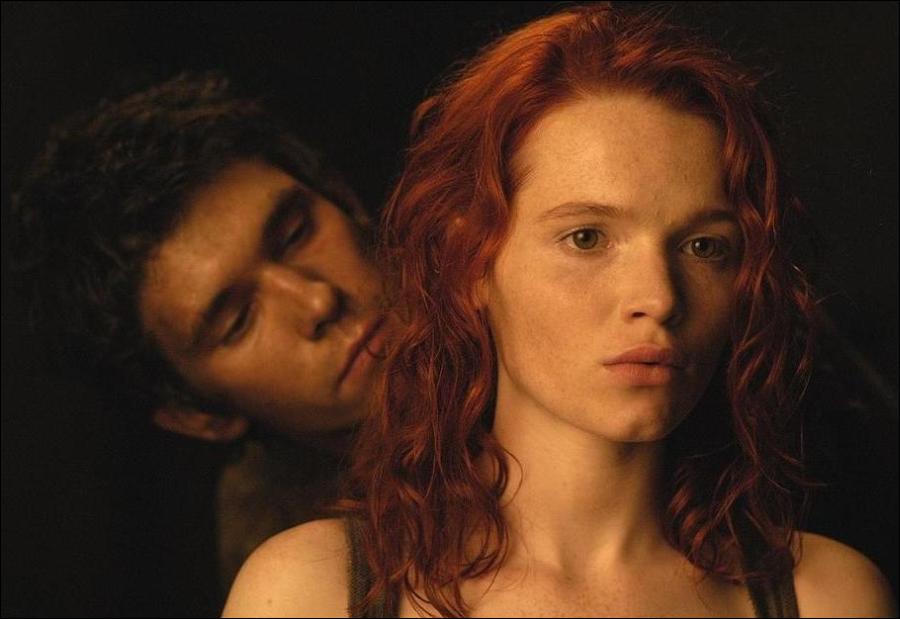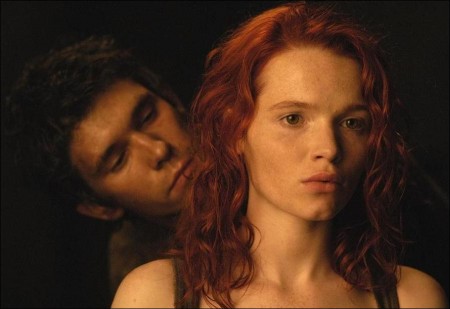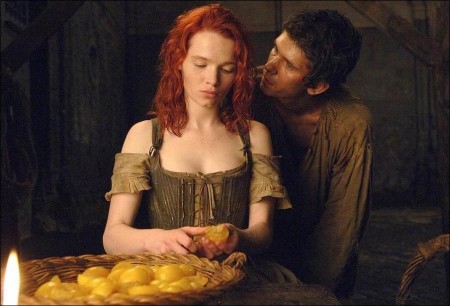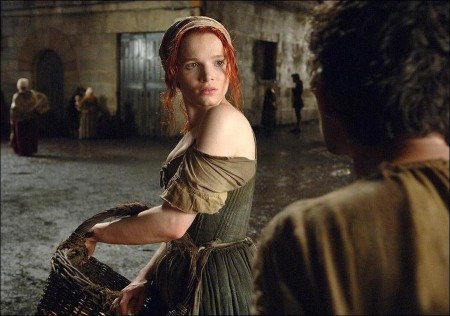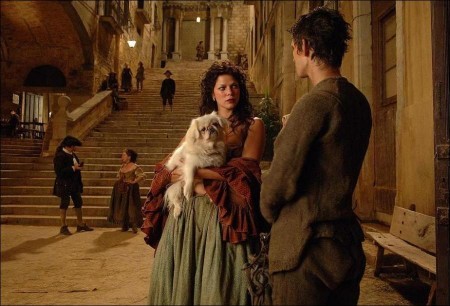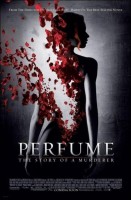Tagline: He lived to find beauty. He killed to possess it.
Based on the bestselling novel by Patrick Süskind, “Perfume” is a terrifying story of murder and obsession set in 18th-century France. Jean-Baptiste Grenouille, orphaned as a newborn in the streets of Paris, is alone in the world. A peculiar child who rarely speaks, Grenouille is alienated from others but blessed with a remarkable gift. His sense of smell is so refined, so attuned to every blade of grass and blossoming flower, that it’s tragic when he’s sold into servitude to a tannery at the age of 13 and surrounded by the foul odors that accompany his labor.
But there comes a day when Grenouille does an errand in town and discovers the object that will transform his life: perfume. Eager to learn the art of creating sophisticated fragrance, he apprentices himself to a once-renowned perfumer, and proves to be a savant whose almost mystical knowledge of scent surpasses anything that can be taught to him by masters of the craft.
Ironically, he was born with no scent of his own, a distinction which colors his undistinguished life. But Grenouille is fearless when it comes to the pursuit of a perfect perfume. When he discovers the most intoxicating scent he has ever experienced – the natural fragrance of a beautiful young girl – he learns that the only method to preserve her innocence and fresh beauty will require murder.
Plaguing the countryside with a series of gruesome killings, Grenouille must stay one step ahead of the authorities until he captures the final ingredient for his greatest perfume – the essence of a beautiful redheaded girl whose wealthy father earnestly protects her. Only then, he believes, will he earn the attention and adulation that his extraordinary talent deserves.
Perfume: The Story of a Murderer brings Patrick Süskind’s international bestseller to the screen twenty years after its initial publication and literary success. Laced with suspense, black humor and metaphysical mystery, the film stars British newcomer Ben Whishaw as Grenouille, who heads a cast that includes Alan Rickman, Rachel Hurd-Wood, and two-time Academy Award-winner Dustin Hoffman.
About the Film
Patrick Süskind’s best-selling novel, Perfume: The Story of a Murderer, has sold over 15 million copies worldwide, has been translated into 45 languages (even Latin) and continues to appear on “must read” lists in publications such as Oprah and In Style.
The most successful German language novel since Erich Maria Remarque’s All Quiet on the Western Front, the historical novel was acknowledged by Nirvana’s Kurt Cobain as his favorite book and the inspiration for the band’s 1993 song “Scentless Apprentice.”
“How could the story of an eccentric 18th-century murderer fascinate so many readers to such an extent?” asks director Tom Tykwer, whose critically acclaimed film “Run, Lola, Run” elevated the German filmmaker to worldwide prominence. “They are universal themes – the desire for recognition, to be loved, to be seen, to be ‘somebody’ and the idea that there’s a genius hiding in everyone, and if it were unleashed, the world would be stunned! It’s a myth we all carry within ourselves.”
Rich with vivid details that conjure the historical sites and smells of Paris as well as the city of Grasse in Provence, the book’s popularity also stemmed from the strange and enigmatic character at the center of Suskind’s story – Jean-Baptiste Grenouille.
“So many people have read this book,” says Tykwer. “We had to find an actor that was not only suitable for us, but who could also fulfil the image of Grenouille conceived by readers who were already familiar with the character. And, at the same time, he had to appeal to a new generation of filmgoers who may not have read the novel. It became obvious that we needed a newcomer, a clean slate, so to speak. We were fortunate to find Ben Whishaw, an actor who is completely fresh and at the same time, rivetingly talented,” says Tykwer.
Twenty-four-year-old Whishaw, a graduate of London’s Royal Academy of Dramatic Arts, had won great acclaim for his performance as Hamlet in Trevor Nunn’s 2004 production at the Old Vic –– following in the rich lineage of Old Vic Hamlets like John Gielgud, Laurence Olivier, Richard Burton, Alec Guinness and Derek Jacobi.
“The entire film depends on the actor playing Grenouille,” adds producer Bernd Eichinger. “We saw many actors but it was not until we found Ben Whishaw that we saw a young man who embodied both the innocent and the murderer. You know you have perfect casting when, after you’ve seen a movie, you cannot imagine anyone else in the role. That’s what we have with Ben.”
Whishaw, who had only appeared in a few small movie roles before he was cast as Grenouille, admits that he “had quite a few butterflies with Bernd for a while because I knew that PERFUME was one of his life’s goals and that he’d fought 20 years to make it.”
In fact, many prominent filmmakers had clamoured to win the motion picture rights to Süskind’s book when it was first published in 1985, and Eichinger was among them. A friend of Süskind’s and a fellow Munich resident, whose credits include “Downfall,” “The Name of the Rose,” “House of the Spirits” and “The NeverEnding Story,” he hoped he might have the inside track.
But Süskind, as reclusive as author J.D. Salinger, would not sell the rights to anyone. A novelist and playwright whose works include the novels The Pigeon and The Story of Mr. Sommer, the play “Double Bass,” the teleplays “Monaco Franze” and “Kir Royal,” he doesn’t grant interviews, accept awards or make public appearances. In fact, only a few public photographs of him exist.
Instead, what did evolve from all the attention around his book was “Rossini,” a humorous screenplay à clef co-written by Süskind. The story tells of the author of the No. 1 best seller (who has not been seen in public for years), the director who wants to film the adaptation, and the big-shot producer who wants to get the rights for himself.
Eichinger’s company, Constantin Film, distributed the film in 1997. Finally, fifteen years after his initial approach, Eichinger’s patience and determination paid off.
“I sensed that something had changed in Patrick’s attachment to the novel,” he says. “My enthusiasm for the story had not diminished. I still believed in the project, so I tried again and we came to an agreement.”
An accomplished screenwriter who wrote the screenplay for his Oscar-nominated German film, “Downfall,” Eichinger began by writing a treatment and asked Andrew Birkin to help him bring his vision of “Perfume” to the screen. Birkin had been one of the writers on Eichinger’s “The Name of the Rose,” and was the writer-director of “Salt On Our Skin” and “The Cement Garden.”
When Tom Tykwer came on board – as a co-writer and director, the creative team was complete. “Tom has a distinctly artistic and innovative vein, but he also has a very popular understanding of film,” says Eichinger. “Because of those two components – the experimental and the popular – he’s an ideal director for this film.”
“My aim from the outset was to make (a film) that was really modern in terms of film language but still remained true to its historical obligations, in the same way the novel’s modern narrative is never sacrificed to its historical accuracy,” says Tykwer.
As the trio began their collaboration on the script, they gained even greater admiration for Süskind’s rendering of his complex central character. “I think the greatest challenge that we were facing in the writing process was how to make Grenouille work,” says Tykwer. “He’s a strange, introverted central character with an exceptional way of perceiving and experiencing the world.”
“Since Grenouille is a man of very few words, we didn’t have the luxury of giving him the usual self-revelatory dialogue that a normal character would have,” explains Eichinger. “He’s a perfectionist, obsessed with creating the ultimate love potion, so to speak. A fragrance, that when possessed, will bring love and adulation to its owner.
Hinging a film on a character like Grenouille breaks every rule in the screenwriting textbook. He has no concept that he belongs to the human race. He is amoral. So it’s not a question of identifying with him, but, rather, of understanding his motives.”
Over the course of the next two years, the writing team continued to hone the screenplay. Adapting the celebrated novel to the language of film, they were committed to stay true to the book – particularly the startling finale in which the townspeople who have gathered to witness Grenouille’s execution move from hate, to sympathy, to affection and finally to uninhibited devotion for the murderer. Intoxicated by his presence, they remove their clothes and erupt in one huge erotic embrace.
The Perfect Chemistry
If perfume is measured by its concentration then film production is measured by its collaboration – how hundreds of artists and craftspeople come together in the creative process. Integral to that chemistry are the actors who bring the story to life and “Perfume” landed two screen legends, two-time Oscar winner Dustin Hoffman, who portrays the master perfumer Baldini and Alan Rickman, as merchant Antoine Richis, who will use extreme measures to protect his beautiful young daughter from a murderer who is at-large.
For a newcomer like Ben Whishaw, the opportunity to work with Hoffman and Rickman was nothing less than inspiring. “It was incredible how Dustin made the atmosphere on the set so light and pleasurable,” says Whishaw. “He has such a joy in his approach, and so much laughter and fun, and he’s almost irreverent about it. He just gets it out, all out and doesn’t censor himself in any way, which I found really extraordinary to see”.
What Whishaw particularly enjoyed about working with fellow RADA graduate Alan Rickman who plays the cunning merchant from Grasse, was his “incredible voice.” Rickman can act out a scene “very stringently but at the same time ethereally; he plays with great depth and you must always be aware with him that there are a lot of other things going on below his surface.”
Whishaw says that his character, a perfumer, affected him in unexpected ways. “My sense of smell hasn’t become superhuman or anything, but I’ve definitely become more aware of the smells around me,” he says. “Certain scents bring back memories from that time of my life. For example, our clapper loader, Nicole, wore a particular perfume every day, and since she was the last person to step in front of me for each take, I would smell that perfume. The next time I smell this perfume, I’ll be brought back to summer 2005.”
Hoffman and Whishaw had a week of rehearsal and a crash course in the art of perfume-making prior to their two-week shoot at Bavaria Studios in Munich. Their scenes were shot in sequence, allowing the actors to follow the natural progression of their characters’ relationship.
“With these two we had found the perfect constellation,” says the director, “On the one hand, the icon of the modern Hollywood movie and on the other the unknown talent who is about to break loose. The pairing fits nicely with the plot of the film.”
Even before shooting, Tykwer had another, historically established duet in mind – the relationship between Salieri and Mozart in “Amadeus.” “The young Mozart, with his vivacious and feather-light artistic skill, drove the old master Salieri totally apoplectic,” says the director. “In ‘Perfume,’ too, an old master denigrates his younger student and quickly discovers that he has an absolute genius in front of him who is vastly his superior.”
Hoffman, who has only appeared in a handful of period films, says that he also saw the similarities to “Amadeus.” “The genius Mozart interacts with the ‘only very good’ musician Salieri,” says Hoffman. “Although Baldini knows how to make perfume, he lacks the natural talent that makes only very few people geniuses.”
Attracted to the opportunity to work with the director, Hoffman explains, “I liked Tykwer’s film ‘Run Lola Run’ a lot. After I saw it, I called him up. We became friends, but only by telephone. At one point I heard from him that he was going to adapt ‘Perfume’ and I remembered having read it 20 years earlier. I wanted to be involved.”
“Tom’s a little on the obsessed side,” Hoffman continues with a laugh. “He prepares himself for his work very precisely. Three or four years of preparatory work are no exception for him. At the same time, he has great respect for the opinions of his actors; he’s always open to new ideas.”
Tykwer’s admiration was mutual. “Dustin has this special aura in which irony and seriousness meet. He can get a wink out of drama and give weight to comedy, which means there is a constant air of ambiguity. Baldini is an extremely important character in PERFUME because he is the only serious counterpart to Grenouille, who otherwise goes through the film with hardly any interaction at all.
For the role of Antoine Richis, Tykwer felt he needed a suitable opponent for Grenouille. “Just as Dustin was my first choice for Baldini, Alan was also my first choice as Richis,” says the director. “We needed an actor to play not only a tender father, but also to be an absolutely serious rival for the brilliant killer,” he explains. “Even if one gets the idea that Grenouille is becoming more and more invincible in the second part of the film, Richis develops in such a way that you start to think: ‘Maybe he really can get Grenouille.’
“Rickman’s pure physical presence should not be underestimated,” Tykwer continues. “When he is sitting on a horse, you think: ‘General, I’m ready to follow you anywhere!’”
Rickman had never read ‘Perfume’ as a novel. What was more important in his decision to accept the role was the theory that a film is the medium of the director’s and he wants to work with “really good” directors.
“I’m a great admirer of Tom’s work,” says Rickman. “Although he is incredibly determined in his work, he is also the most charming, open and selfless person I know.
So the atmosphere on the set was enjoyable from start to finish,” he adds. When Grenouille arrives in Grasse – the town in which he will learn the art of “enfleurage” (the extraction of flowers’ precious essential oils), he becomes obsessed with Laura, Richis’ daughter, portrayed by sixteen-year old British actress Rachel Hurd-Wood.
“Grenouille’s obsession with Laura is all in his mind and from a distance,” says Whishaw. “He doesn’t know her or anything about her as a human being. All he knows is her smell; that’s all she is to him, an overwhelming smell. It’s disturbing – the strangest kind of love affair, based on something totally wrong.”
Hurd-Wood first came to the attention of screen audiences as Wendy Darling in the 2003 film Peter Pan. “Laura is like a butterfly; she’s always trying to fly away and her father is always trying to pull her back,” she explains. “She’s wild, carefree, and vivacious. She is blissfully unaware that Grenouille could be targeting her.”
The young actress admits that she was honored to be involved with the adaptation of Süskind’s novel. “Patrick Süskind has managed to put so many layers into the narrative and maintain them throughout, despite the complexity of the content. Everybody gets something different out of it.”
These production notes provided by DreamWorks Pictures.
Perfume: The Story of a Murderer
Starring: Ben Whishaw, Alan Rickman, Rachel Hurd-Wood, Dustin Hoffman, Karoline Herfurth, Jessica Schwarz
Directed by: Tom Tykwer
Screenplay by: Bernd Eichinger, Andrew Birkin, Tom Tykwer
Release: December 27, 2006
MPAA Rating: R for aberrant behavior involving nudity, violence, sexuality, and disturbing images.
Studio: DreamWorks Pictures
Box Office Totals
Domestic: $2,223,293 (1.6%)
Foreign: $132,816,631 (98.4%)
Total: $135,039,924 (Worldwide)
